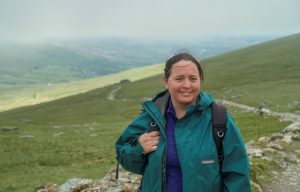Farmer and ecologist Sorcha Lewis was guest speaker at a Nature and People Project Steering Group meeting with a presentation on “Nature Friendly Farming”.
Sorcha and her husband Brian Lewis are third generation tenant farmers living at Troedrhiwdrain Farm with their two children. She explained that Troedrhiwdrain means ‘at the foot of the thorny bank’ and is a 580ha family upland farm.
The Elan Valley located in Mid Wales is a mosaic of moorland, woodland and reservoirs held back by grand Victorian dams. The Welsh Water Elan Valley Trust is a charitable Trust which holds a 999 year lease over of much of the water catchment and are the landlords for the farming community that live there.
Over the last 15 years the productivity of the farm has been developed, whilst successfully retaining and incorporating many important habitats, including hay meadows, ffridd and rhos pasture.
A number of traditional breeds are used on the farm including Badger faced Welsh Mountain, Welsh Mountain and Herdwick sheep. Consideration has also been given to introduce cattle as a management tool for the rhos pasture to further benefit a number of species.
Sorcha, deputy chair of the Nature Friendly Farming Network, explains: “One valuable and increasingly rare habitat found on the farm are the traditional hay meadows, 97% of which have been lost across England and Wales since the 1930s. These help produce quality slow-grown lambs which feed on the herb-rich swards”.
Sorcha and Brian manage the farm with nature in mind, creating habitats to benefit nature as well as the farm business; they have increased the area of ffridd found around the farm. Ffridd is a habitat found on the land between the enclosed fields and the open hill, typically steeply sloping and dominated by scrub, these areas are difficult to manage but provide an important wildlife habitat.
The Ffridd areas around Troedrhiwdrain are home to populations of declining bird species including ring ouzel, red grouse and cuckoo. They are also home to the Welsh clearwing moth which has been identified as a biodiversity priority by the Welsh Government, birch trees are being planted at
Troedrhiwdrain to provide suitable habitat for this important population of these wasp like, day flying moths.
Sorcha adds: “We support wildlife friendly farming because we feel a responsibility to generations to come. Knowing what we have and how important it is means we feel a responsibility to share the diversity that is here in the Welsh uplands. I feel farmers who consider the environment should be rewarded and celebrated. Farming has often received a rather bad press, yet many farmers are protecting and managing our landscape”.
Nature and Farming

Get in touch
E-mail: severncatchment@aol.com
